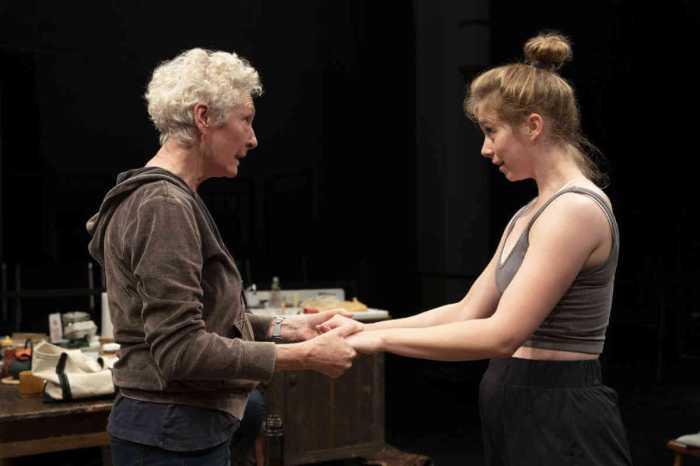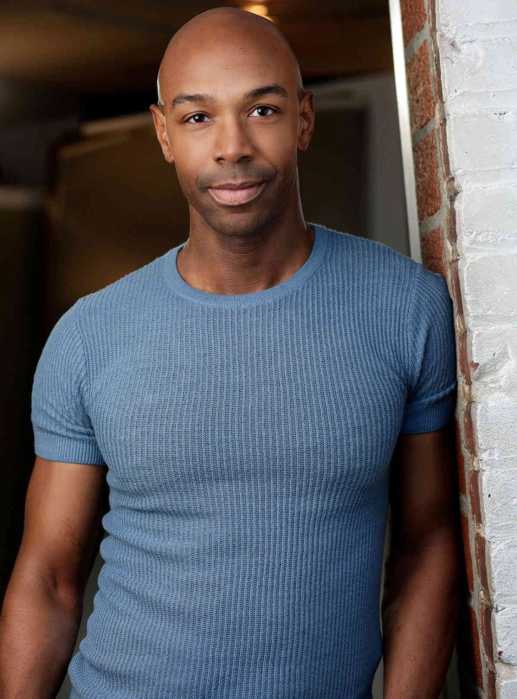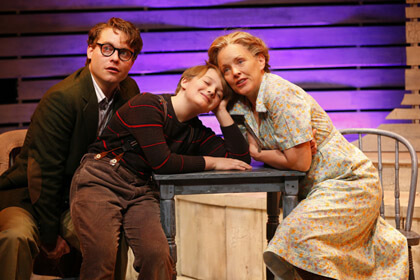The galvanizing and often hilarious and heartbreaking “Ain’t No Mo,’” now at the Public Theater, combines satire, absurdism, and trenchant observation in a series of sketches aimed at defining the black experience in post-Obama America. Beginning with a gospel funeral for “Brother Norighttocomplain” who expired when a black man was elected president, “Ain’t No Mo’” looks at everything from stereotypes like “bitches and hos,” to abortion, prison’s corrosive impact on the soul, and assimilated families who try to wash away their race through economic success. The story’s conceit is that America’s black people are given a free flight back to Africa, and one of them, Peaches — an over-the-top drag persona marvelously brought to life by the playwright, Jordan E. Cooper — is responsible for getting everyone on board. In each vignette, characters are reminded via text that time is running short and their window of opportunity is fast closing.
Race, racism, and the integration of the black experience into American life are the key themes, and the metaphor for that cultural contribution is a piece of colorful luggage dubbed Miss Bag. If Miss Bag is taken away, what is lost? The satire has an undercurrent of anger but Cooper does not make his characters victims. They each have a role in creating this world, where they struggle to survive in a culture and under a government willing to eradicate them.
Directed by Stevie Walker-Webb, the cast includes, besides Cooper, Fedna Jacquet, Marchánt Davis, Simone Recasner, Ebony Marshall-Oliver, and Crystal Lucas-Perry. They are all outstanding, whether playing over-the-top-stereotypes or more naturalistic characters.
This is a piece that has its roots in a tradition of racial satire dating back to the 1960s. It recalls Adrienne Kennedy’s “Funnyhouse of a Negro” from 1964 that wrestled with defining racial identity and Douglas Turner Ward’s 1965 “Day of Absence,” in which all the black people disappear from a town, which was played by an all -black cast in white face. This in turn gave rise to work by George C. Wolfe and the ‘90s TV series “In Living Color.” Like its predecessors, this is, in one sense, a comedy, but the fact that these issues are still ingrained in our culture 50 years on is anything but funny, and that makes it pointed satire.
One might sum up much of Chekhov with the phrase “life sucks.” That’s certainly what Aaron Posner has done in choosing this phrase for the title of his loose adaptation of “Uncle Vanya.” Chekhov cast a cold eye on love, longing, relationships, and the inevitable disappointments of life. These are timeless issues, integral to the human condition, and in updating the play to the present day, Posner shows us just how true this is.
The play tracks the plot of the original as a family and their friends try to negotiate somewhat bleak lives. Posner adds a very contemporary meta overlay to this as the characters comment on the play to the audience, and even engage them in conversation — or attempt to. This abstract and acknowledged theatricality is fascinating, even compelling, giving the piece an immediacy that resonates with themes of futility, tedium, and constant searching for happiness that is just out of reach — or unattainable altogether because of previous bad choices.
The country estate where this all transpires, however, is no bleak house. Chekhov always saw the comedy in humanity, and Posner finds that as well. We recognize ourselves in these characters and their foibles and failures, and like any mirror we can’t resist looking into it.

Jeff Wise directs for the Wheelhouse Theater Company, which staged the marvelous “Happy Birthday, Wanda June” earlier this season. The talented company, with notable performances by Austin Pendleton, Michael Schantz, Jeff Biehl, and Nadia Bowers, consistently strikes just the right balance between realism and self-aware irony. And, as with the original Chekhov, you might leave the theater thinking life sucks sometimes, but at least you’ll know you’re not alone. You might as well laugh a bit and keep going.
Seán O’Casey’s plays take a hard, if often darkly humorous, look at the effects of Ireland’s revolutionary politics after the 1916 Easter Uprising on the lives of ordinary people struggling to get by in Dublin. The juxtaposition of bravado and powerlessness among the city’s tenement denizens living in sometimes desperate poverty has created some of the most indelible characters of modern theater.
Two of the plays of O’Casey’s Irish Trilogy — “Juno and the Paycock,” set during the Irish Civil War, and “Shadow of a Gunman,” set during the Irish War for Independence — are currently getting spectacular revivals at the Irish Repertory Theatre. (The third play “The Plough and the Stars” completes Irish Rep’s O’Casey season when it debuts later this month.) Seeing these plays in repertory reinforces their power, politics, and poetry as they tell the stories of how tiny details of their lives such as a supposed inheritance in “Juno” or a flirtatious lie in “Gunman” have destructive consequences well beyond their intention.
Both of these are character-driven tragi-comedies, and under the direction of Neil Pepe (“Juno”) and Ciarán O’Reilly (“Gunman”), the worlds of the plays are richly developed and beautifully realized. Pulsing under each of these simple stories is the constant threat of violence and death just outside the door.
The company members find every nuance in their respective roles. Maryann Plunkett who plays Juno is sublime. As O’Reilly, her wastrel husband, Jack Boyle is charming and awful at the same time. James Russell is the romantic poet in “Gunman” and the opportunistic suitor in “Juno,” and he is perfect in both. John Keating is the despicable Joxer in “Juno” and the self-aggrandizing Mr. Grigson in “Gunman,” making two of O’Casey’s most reprehensible characters creepily appealing.
The “jukebox musical” is often unfairly maligned. The trick with a musical that draws on well-known songs from a particular niche is to make a good show. Yes, recent years are littered with ones that fell short, but consider that “Jersey Boys,” “Beautiful,” and “The Cher Show” continue to deliver audiences and box office, and you’ll understand the appeal to producers.
Now you can add “Ain’t Too Proud: The Life and Times of The Temptations” to the roster of shows in this genre that work. And not just work; this is decidedly a hit. Based on a book by Otis Williams, the show tracks the rise of the group, its evolution and changes, politics and longevity. Dominique Morisseau’s book for the show uses Williams as a narrator, but she gives enough depth to each of the characters — and there are a lot of them — to connect clearly and emotionally to the audience. For those of us who knew the music but not the stories behind it, the show touches not only on the personal but also on larger themes about the evolution and staying power of the Motown sound.

Director Des McAnuff and choreographer Sergio Trujillo make the show as dazzling to look at as it is heartfelt. The company led by Derrick Baskin as Otis, with James Harkness, Jawan M. Jackson, Jeremy Pope, and Ephraim Sykes, as the original members of the group, are all top-notch triple threats — singing, acting, and dancing.
You may be enticed to see this because you love the music of The Temptations, but you’ll also get a hugely entertaining Broadway show that’s well worth your money. Sounds like a win to me.
AIN’T NO MO’ | The Public Theater. 45 Lafayette St., btwn. E. Fourth St. & Astor Pl. | Through May 5: Tue.-Sun. at 7 p.m.; Sat.-Sun. at 1 p.m. | $65; publictheater.org or 212-967-7555 | Two hrs., no intermission
LIFE SUCKS | The Wild Project, 195 E. Third St., btwn. Aves. A & B | Through Apr. 20; schedule varies | $20-$79 at wheelhousetheater.org or 866-811-4111 | Two hrs., 15 mins., with intermission
JUNO AND THE PAYCOCK/ SHADOW OF A GUNMAN | Irish Repertory Theatre, 132 W. 22nd St. | Through May 25: in repertory: | $50-$70; irishrep.org or 866-811-4111 | Each: two hrs., intermission
AIN’T TOO PROUD | Imperial Theatre, 249 W. 45th St. | Tue., Thu. at 7 p.m.; Wed., Fri.-Sat. at 8 p.m.; Wed., Sat. at 2 p.m.; Sun. at 3 p.m. | $49-$179 at telecharge.com or 212-239-6200 | Two hrs., 30 mins., with intermission



































